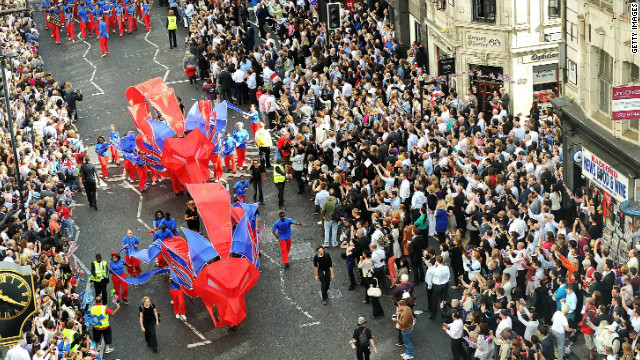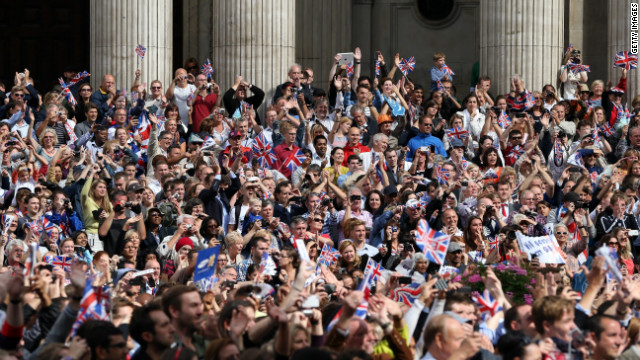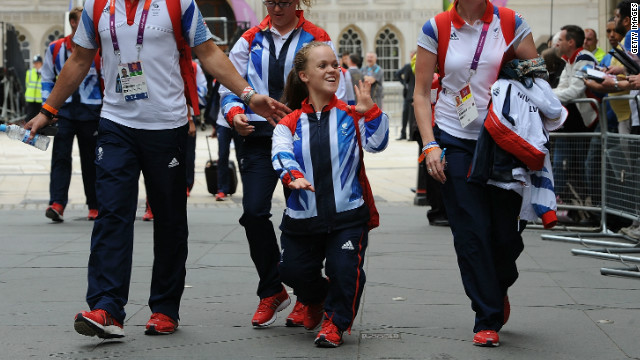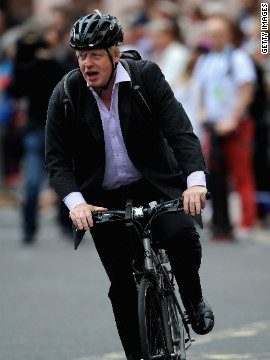The Games will also have
inspired millions across the globe to pursue sporting careers across a
range of disciplines. But arguably London 2012's legacy is more
intangible.
Who would have thought gold medallists like American swimmer Mallory Weggemann, Brazilian Alan Oliveira, South Africa's double amputee Oscar Pistorius and Briton's Ellie Simmonds (swimming), Jonnie Peacock (athletics) and David Weir (wheelchair racer) would become household names across the world?
 Recording unprecedented
crowds, with some two-and-a-half million tickets sold, the British got
behind the Paralympics in a way that no other country has previously
done and helped shift perceptions towards disability around the world as
they did so.
Recording unprecedented
crowds, with some two-and-a-half million tickets sold, the British got
behind the Paralympics in a way that no other country has previously
done and helped shift perceptions towards disability around the world as
they did so.
The Star newspaper in
Pistorius' home nation captured an emotion reverberating around the
globe saying that the Paralympic Games have marked a watershed in the
way the planet views disability.
 London 2012: The victory parade
London 2012: The victory parade
"The 2012 Paralympics
will live long in the memory as the Games where South Africa and the
world learnt that these Games were not the fun games nor the 'shame'
games," wrote The Star.
"London was where the
athletes became professional, where they became elite and celebrated
their elevation to a new status," the newspaper added.
It was a Paralympics
where spectators finally started to focus on ability rather than
disability, a request many Paralympians have always made.
"I think people are going
to look back at this Paralympic Games and for the first time really,
truly believe that Paralympic sport is not just inspirational, it's
hard-core sport," said Pistorius.
Born with a congenital defect, Pistorius had both legs amputated below the knee when he was 11 months old.
But the 25-year-old has
overcome his disability to such an extent that he became the first
double amputee to compete at the Olympics when running in South Africa's
4x400m relay team this summer.
The achievements of Kenya's Mary Zakayo have also helped change attitudes to Paralympic sport in Africa.
The wheelchair-bound
javelin and shot put thrower was the women's Whang Youn Dai Achievement
Award winner in Sunday's Paralympic closing ceremony -- an award given
to a male and a female athlete who exemplify the Paralympic spirit.
"Because of my success
in field events, more women with disabilities in my community and in
Kenya have shown interest in sports," Zakayo says.
"The Paralympic Movement
is spreading in my country and opens opportunities for people with
disabilities and help change the perceptions towards people with
disabilities in a positive way."
But it's not just Africa where attitudes are changing.
The Gulf Daily in
Bahrain has been won over, crediting this year's Paralympics with
providing a "fundamental change in the way much of the world looks at
disability," adding that the Games "swiftly taught us to look beyond
disability towards achievement."
Thirty-two years after
Moscow refused to stage the Paralympics, the enthusiasm shown by the
organizers, the British crowds and, of course, the athletes at this
summer's Games has finally begun to convert the Russian public, says
tabloid Komsomolskaya Pravda.
"Russians are not used
to encountering disabled people in the street ... yet for the first
time, they discovered a previously unknown sporting world and its
courageous fighters," the paper said.
Even in Britain,
attitudes have been changing. Polls conducted during the Games showing
that eight out of 10 British adults thought the 2012 Paralympics had had
a positive impact on the way disabled people are viewed by the public.
This would be yet
another triumph for the London 2012 organising committee whose chairman,
Lord Coe fervently believes that the British public will never view
sport nor disability in the same way after this summer's Paralympics.
"We set a goal to create awareness," said Lord Coe, the chairman of the London 2012 Organising Committee.
"I really think we have
done that in helping converting some of those extraordinary talents into
household names. I really genuinely think we have had a seismic effect
in shifting public attitudes (towards disability)."
On Monday afternoon, the
likes of Simmonds, Peacock and Weir were joined by fellow Paralympians
and Olympians as crowds estimated to be in excess of one million
thronged the streets of London to wave goodbye to what Prime Minister
David Cameron called a "golden summer of British sport."
It officially ended on
Sunday as the Paralympics closing ceremony extinguished the flame in the
Olympic Stadium for the final time, before the Paralympic flag was
handed to the Mayor of Rio de Janeiro, the Brazilian city which will
host both Games in 2016.
And if the legacy of
London 2012 really proves to be a defining shift in the global attitude
towards disability, then what on earth could Rio expect to achieve in
four years time?


No comments:
Post a Comment